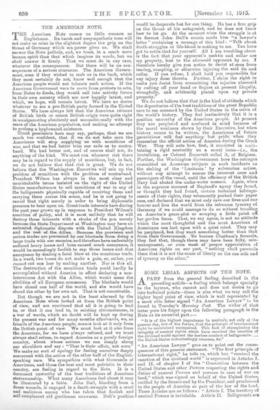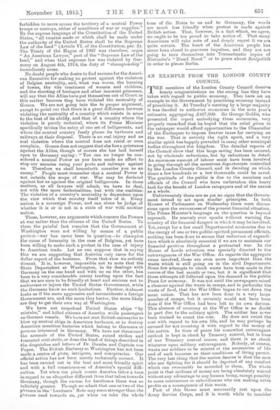SOME LEGAL ASPECTS OF THE NOTE. A PART from the general
feeling described in the preceding article—a feeling which belongs specially to the layman, who cannot and does not desire to go into technical points—there is also what we may call the. higher legal point of view, which is well represented by a most able letter signed " An American Lawyer " to be. found in Tuesday's Morning Post. The writer of that letter puts his finger upon the following paragraph. in the Note as its essential part :— "It is of the highest importance to neutrals, not only of the present day, but of the future, that the principle of international right be maintained unimpaired. This task of championing the integrity of neutral rights which have received the sanction of the civilized world against the lawless conduct of belligerents... the 'United States unhesitatingly assumes,, &e," "An American Lawyer" goes on to point out the conse- quences of this general statement. ".The first principle of international right," he tolls us, which has "received the sanction of the civilized world" is expressed in Articles I. and IL of chapter 1 of the " Convention between the United States and other Powers respecting the rights and duties of neutral Powers and persons in case of war on land," which was signed on behalf of the United Staten, ratified by the Senate. and' by the President, and proclaimed to the people of America as part of the law of the laud. These Articles are as follows : "Article I. The territory of neutral Powers is inviolable. Article II. Belligerents are forbidden to move across the territory of a neutral Power troops or convoys, either of munitions of war or supplies." By the express language of the Constitution of the United States, " all treaties made or which shall be made under the authority of the United States shall be the Supreme Law of the land" (Article VI. of the Constitution, par. 2). The Treaty of the Hague of 1907 was therefore, urges " An American Lawyer," part of the " Supreme Law of the land," and when that supreme law was violated by Ger- many on August 4th, 1914, the duty of "championship" immediately arose. No doubt people who desire to find excuses for the Ameri- can Executive for making no protest against the violation of Belgian neutrality, and, what was worse, the burning of towns, the vile treatment of women and children, and the shooting of hostages and other innocent prisoners, will say that the Allies have put themselves out of Court in this matter because they have violated the neutrality of Greece. We are not going into the to guoque argument, except to point out that there is a great. difference between violating the neutrality of a country which resists in arms to the best of its ability, and that of a country where the violation is purely technical, where its Prime Minister specifically invites the entry of one set of belligerents, and where the neutral country freely places its harbours and railways at their disposal. There is no real injury and no real violation where the neutral does not resist or even complain. Greece does not suggest that she has a grievance against the Allies, though of oourse she has laid herself open to Germany saying: " You can no longer be con- sidered a neutral Power as you have made no effort to stop our enemies using your ports and railways against us. Therefore we shall henceforth consider you as an enemy." People must remember that a neutral Power is not outside the scope of war. War may be declared against her as against the original belligerents. In these matters, as all lawyers will admit, we have to deal, not with the mere technicalities, but with the realities. The violation of a country's neutrality is dependent upon the view which that country itself takes of it. Every nation is a sovereign Power, and can alone be judge of whether it is or is not in a state of war with another nation.
These, however, are arguments which concern the Powers at war rather than the citizens of the United States. To them the painful fact remains that the Government at Washington were not willing by means of a public protest—war has never been in question—to champion the cause of humanity in the case of Belgium, yet have been willing to make such a protest in the case of injury to American trade. Let no one. suppose that in saying this we are suggesting that America only cares for the dollar aspect of the business. From that view we entirely dissent. It is, however, impossible not to note that the State Departnfent at Washington, in its dealings with Germany on the one hand and with us on the other, has been to a very considerable extent trading upon the fact that we are sure to be friendly at heart and anxious not to embarrass or injure the United States Government, while the Germans know no such limitations. Further, it almost looks as if the more aggressive and inconsiderate a foreign Government are, and the more they hector, the more likely are they to get their own way at Washington.
We have not torpedoed United States ships "by mistake," and killed citizens of America while passengers on German vessels. We have not sent British emissaries to blow up neutral ships in American harbours, or to destroy American munition factories which belong to Germans or persons interested in Germany. We have not threatened the arsenals of the United States, raised strikes and fomented civil strife, or done the kind of things described in the despatches and letters of Dr. Durnba. and Captain von Papen. The British Embassy at Washington has not been made a centre of plots, intrigues, and conspiracies. Our official action has not been merely technically correct. It has been carried out in the best and most friendly spirit and with a full consciousness of America's special diffi- culties. Yet when the pinch comes America takes a tone in regard to us altogether different from that taken towards Germany, though the excuse for harshness there was so infinitely greater. Though we admit that one or two of the phrases in the • Lusitania Note may seem stronger than the phrases used towards us, yet when we take the whole tone of the Notes to us and to Germany, the words are much less friendly when protest is made against British action. That, however, is a fact which, we agree, we ought to be too proud to take notice of. That many Americans will take note of and deeply regret it we are quite certain. The heart of the American people has never been closed to generous impulses, and they are not going to turn themselves into Transatlantic copies of Nietzsche's " Blond Beast " or to prate about Rialpolitik in order to please Berlin.







































 Previous page
Previous page